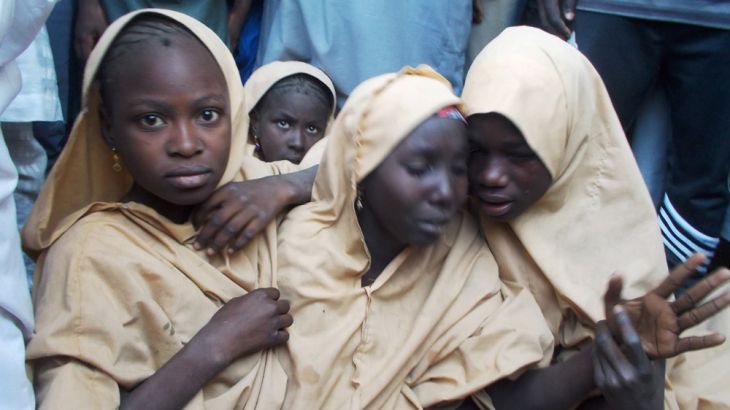Boko Haram frees group of abducted Nigerian schoolgirls
Children were abducted from school by about 50 armed men in the northern town of Dapchi last month.

Nearly all of the 110 schoolgirls abducted by Boko Haram in northeastern Nigeria last month have been released by the armed group, according to the government.
The government said on Wednesday that 101 of the 110 schoolgirls had been confirmed freed and the number “would be updated after the remaining ones have been documented”.
Keep reading
list of 4 itemsTen years after ‘Bring Back Our Girls,’ Nigeria’s kidnappings continue
Why mass kidnappings still plague Nigeria a decade after Chibok abductions
Children kidnapped in northern Nigeria have been freed
“No ransoms were paid,” Lai Mohammed, Nigeria’s information minister, said in a statement.
The girls were released “through back-channel efforts and with the help of some friends of the country and it was unconditional”.
A decision against military “confrontation” was part of the agreement, Mohammed said.
The schoolgirls were abducted after fighters stormed the Government Science and Technical College in Dapchi, in the northeastern state of Yobe, on February 19.
Bashir Manzo, whose 16-year-old daughter was among those kidnapped, confirmed his daughter was among those freed.
“As I speak to you there is jubilation in Dapchi,” he said.
|
|
Residents in Dapchi fled on Wednesday morning upon hearing that Boko Haram vehicles were headed towards the town.
“We fled but from our hiding we could see them and surprisingly, we saw our girls getting out of the vehicles,” Umar Hassan told the Associated Press news agency.
Another resident, Kachallah Musa, said: “They assembled the girls and talked to them for some few minutes and left without any confrontation.”
Witnesses said the fighters also warned residents: “Don’t ever put your daughters in school again.”
Boko Haram means “Western education is forbidden” in the Hausa language.
Public pressure
Al Jazeera’s Ahmed Idris, reporting from Nigeria’s Yolo, said the abduction prompted public anger against the government for failing to prevent it, which put a lot of pressure on the authorities to act fast.
“The government deployed a lot of resources, including aircraft and heavy equipment on the ground, to pursue abductors of these girls,” he said.
Amnesty International on Tuesday cited security officials and witnesses as saying the military and police received at least five calls in the hours before the February school attack but failed to act. Nigeria denied the accusations.
In 2014, Boko Haram abducted 276 schoolgirls from Chibok, in northern Borno state, and about 100 never returned to their families.
The latest mass abduction is believed to have been carried out by a Boko Haram splinter group aligned with Islamic State of Iraq and the Levant (ISIL).
Nigeria’s government celebrated the girls’ release.
GREAT NEWS from Dapchi, Yobe State. Thank God for the safe return of our sisters. Alhamdulillah!
— Bashir Ahmad (@BashirAhmaad) March 21, 2018